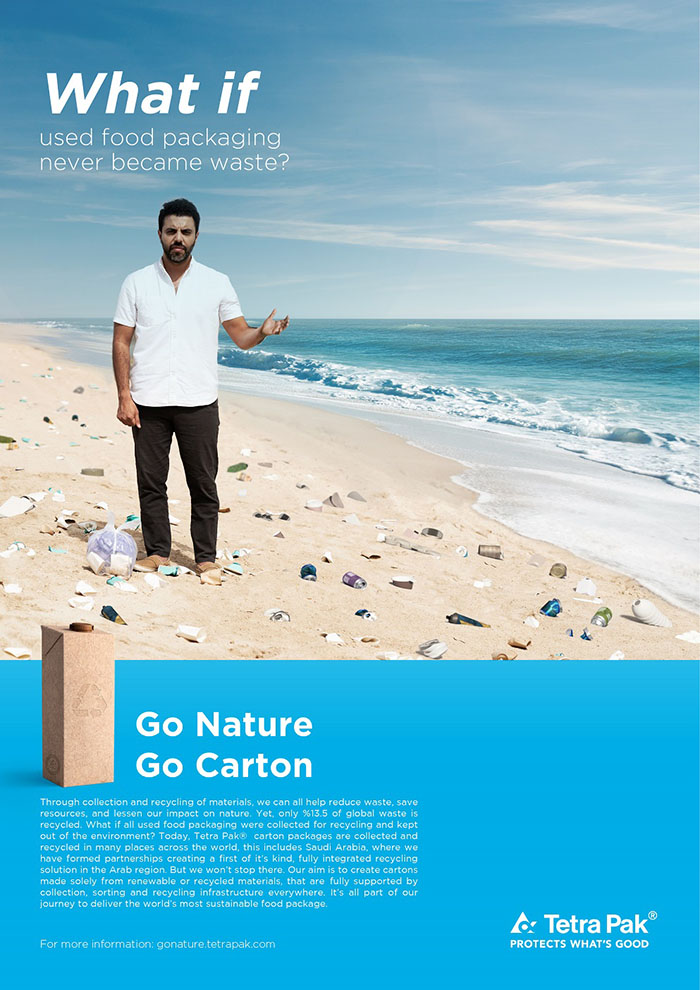Tetra Pak, the world leading food processing and packaging solutions company, has traditionally been ahead of it’s time within and outside the industry, in pursuing sustainable solutions for both customers and consumers. This facet of the company’s DNA manifests itself in clear goals for a sustainable future that include 100% renewable packages by 2030 and carbon neutrality by 2050.
With a value chain approach, sustainability includes responsible sourcing, lower carbon footprint, renewable materials, recyclability and recycling itself, all while ensuring efficiency, cost effectiveness, food safety, food preservation and reduction of food waste and availability across the plant.
On this journey towards a more sustainable planet, Tetra Pak Arabia Area launched the “Go nature. Go Carton.” campaign to draw attention towards the climate challenge and inspire people to learn more about the environmental impact of food packaging, and Tetra Pak’s efforts to address these issues. For its work so far, Tetra Pak has recently been recognized as one of the Top 50 Sustainability and Climate leaders.
By 2050 the world’s population is predicted to reach 9.1 billion, which will require an increase of 70% in food availability. Packaging helps keep food safe, nutritious, and available. And, with 33% of food lost or wasted each year, high-performance packaging plays a critical role in today’s global food delivery system. Tetra Pak believes that sustainable food processing and packaging solutions can make a difference, feeding a growing population while helping mitigate climate change and address other environmental concerns.
Tetra Pak cooperates with many key players across the value chain, alongside more than 170 recycling operations around the world, to advance the entire recycling value chain. By strengthening global carton recycling infrastructure, the company can ensure cartons are transformed into new raw material and products, keeping valuable resources in use to help build a circular economy.
“High-performance food packaging plays a critical role in feeding the world, but it must do so sustainably, so that food availability does not come at the cost of the planet. This lies behind Tetra Pak’s commitment to making food safe and available, everywhere, in a way that protects what’s good – protecting food, protecting people as well as protecting the planet. To minimise climate impact while helping to ensure food security for the future, we are taking a full life cycle view of our solutions”, said Niels Hougaard, the Managing Director of Tetra Pak Arabia Area and Cluster Leader Sales Management for Greater Middle East & Africa.
“We are seeking opportunities across the entire recycling value chain to improve how cartons get recycled. We see it as our fundamental obligation to support collection, sorting and recycling of packaging. That’s why, in synergy with food manufacturers, municipalities, recyclers and other stakeholders across the industry, we are on a journey to develop and scale the recycling of paper-based cartons, helping to make them the world’s most sustainable food package. We are also driving consumer engagement around recycling in cooperation with our customers and partners . It is also worth mentioning that in Saudi Arabia, we have formed the first-of-its-kind recycling partnership in the region with OPI “Obeikan Paper Industries” to recycle paper of collected post-consumer cartons . OPI have their own company-wide waste management and is ready to start working on programmes that increase collection and contribute to a sustainable recycling value chain. In addition to that, a new recycling partnership with STP “Saudi Top Plastics Factory”, the leading plastic recycling plant in the region, was formed to recycle the remaining plastic and aluminium compound residue resulting from cartons recycling at OPI. STP brings 15 years of experience in its scope, carrying a capacity to recycle about 50 thousand tons of plastics annually. All these developments come together to ensure that our packages can be fully recycled”, he added.
Tetra Pak cartons contain about 70% paperboard produced from wood fibers, that are responsibly sourced. Tetra Pak operates in accordance with the FSC™ voluntary sustainability standards and 100% of the paperboard it uses is FSC™-certified. This means that all the forests, which are a primary source of the raw materials for paperboard production, are managed in a way that protects biodiversity and ensures regeneration. The company has been working to increase the percentage of cardboard in its packages and keeps incfeasing its efforts to ensure that raw materials for manufacturing come from responsible and sustainable sources.
Go nature. Go carton. Join the movement!


COMMENTS